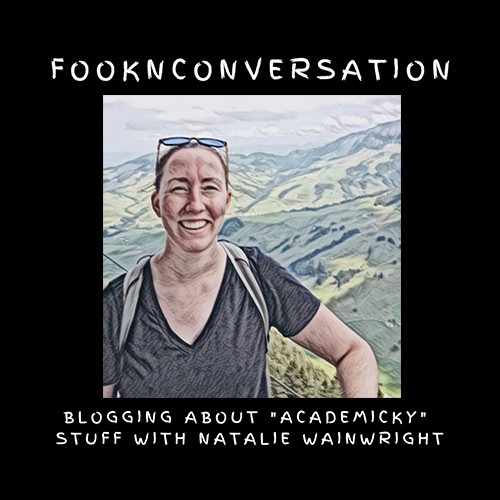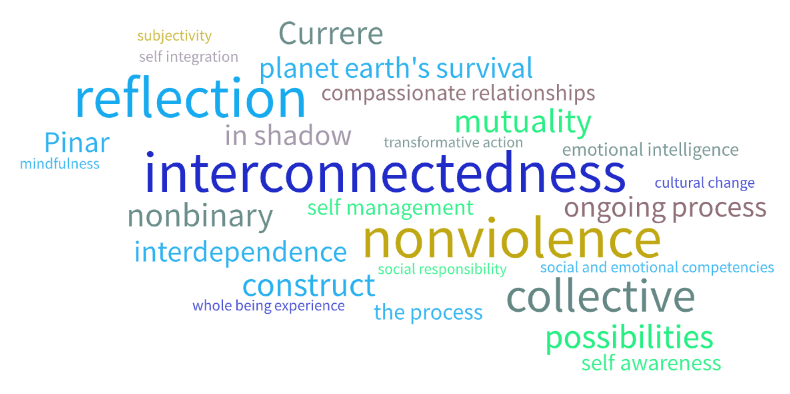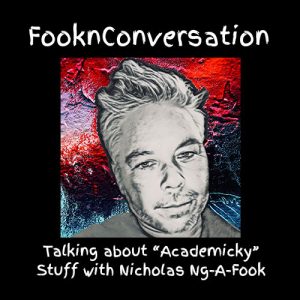
A blog by Natalie Wainwright.

I created this word cloud before getting started in order to flesh out the concepts that Dr. Hongyu Wang presents in her interview and articles. After getting my ideas down, I decided to look at Dr. Wang’s work through Bastille’s Flaws, which speaks to my personal relationship to her work, and also how I see Dr. Wang’s ideas finding fruition in a school setting (Smith, 2011, track 1).
When all of your flaws and all of my flaws
Are laid out one by one
The wonderful part of the mess that we made
We pick ourselves undone
Dan Smith (Bastille songwriter and frontman) begins by recognizing that both partners have weaknesses. However, he juxtaposes the word “wonderful” next to “flaws” and “mess.” Here, Wang recognizes that reflection is not easy. It can be difficult to differentiate what is “a part of me” and what constructs “have been put on me” (Ng-A-Fook, Fooknconversation Episode 3, 2020). Additionally, reflecting and finding things that we don’t like about ourselves can be especially challenging. Wang (2018) calls us to do “shadow work” which transforms our flaws into (wonderfully productive) action.
All of your flaws and all of my flaws
They lie there hand in hand
Ones we’ve inherited, ones that we learned
They pass from man to man
As Smith identifies, there are forms of violence that we’ve inherited and there are ones that we’ve learned. In interviews and weekly responses, Wang’s students identified systemic flaws as their biggest challenge to implementing nonviolence at school, including metal detectors, bag checks, and monthly testing (Wang, 2018, pg. 232). Parallel to Wang’s students’ feelings of inadequacy and paralysis, I have felt defeated as I struggle with transforming guilt or anger into something that ignites change. For example, police brutality in the United States is at the forefront of the news I consume on social media. This systemic issue feels so overwhelming that I feel powerless. While violence permeates the news, school yard and classrooms, Wang uses similar terminology to Dwayne Donald and comforts us with the fact that these forms of violence are learned, and therefore can be “unlearned.” She recognizes that it will take time for systemic change. But to do so, we must try to change our feelings into transformative action. As a reflective person, I feel that identifying places for improvement is easy, whereas taking action is can be more difficult.
There’s a hole in my soul
I can’t fill it, I can’t fill it
There’s a hole in my soul
Can you fill it? Can you fill it?
In the third stanza, Smith recognizes his interdependence on his partner, asking them to fill the hole in his soul. In order to execute nonviolence, we must recognize that working together as a collective affords us more possibilities. In the podcast interview, Wang draws the comparison of the United States and China in order to demonstrate two very different approaches to the Covid-19 crisis. Part of China’s traditions in philosophy is the concept of “mutuality,” in which citizens understand that when you take care of yourself, you are taking care of others. The United States on the other hand is a very individualistic society (Nicholas, Ng-A-Fook, Fooknconversation Episode 3, 2020). Wang’s framework for nonviolence comes back to Dwayne Donald’s call for relationship building and living life well. If we are going to cultivate compassion within our students, we must be willing to self-examine what we bring to the table and “unlearn” how we have historically related to others.
References:
Donald, D. (2009). Forts, curriculum, and Indigenous Métissage: Imagining decolonization of Aboriginal-Canadian relations in educational contexts. First Nations Perspectives, 2(1), pp. 1-24.
Donald, D. (2019). Homo economicus and forgetful curriculum: Remembering other ways to be a human being. In S. Styres, H. Jahnke & S. Lilly (Eds.). Indigenous education: New directions in theory and practice. Edmonton: University of Alberta Press, pp. 103-125.
Ng-A-Fook, N. (2020). Episode 3: Hongyu Wang. Fooknconversation. Podcast. https://www.fooknconversation.com/podcast/episode-03-hongyu-wang/.
Smith, D. (2011). Flaws [Recorded by Bastille]. On Bad Blood [Record]. London: Young and Lost Club.
Wang, H. (2018). Nonviolence as teacher education: a qualitative study in challenges and possibilities. Journal of Peace Education, 15(2), pp. 216-237.
Wang, H. (2019). An Integrative Psychic Life, Nonviolent Relations, and Curriculum Dynamics in Teacher Education. Studies in Philosophy and Education 38, pp. 377–395.

